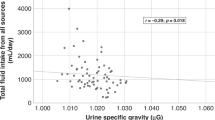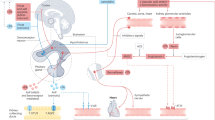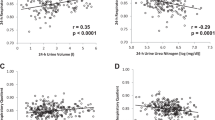Abstract
Objective:
To describe associations between hydration status and dietary behaviour in children, as current research indicates that hydration status is influenced by nutrition vice versa, hydration status may influence dietary behaviour.
Design:
Cross-sectional analyses of data from the Dortmund Nutritional and Anthropometric Longitudinally Designed Study, (DONALD) using 24-h urine samples to determine the hydration status and 3-day weighed food records to describe the dietary profile of the children.
Setting:
Secondary analyses of data from an observational study.
Subjects:
A group of 4–11 year old children living in Dortmund, Germany; N=717.
Methods:
Hydration status was determined by calculating the ‘free water reserve’, using analyses of the 24-h urine samples. Nutrient intake per day was calculated from the 3-day weighed food records. Children were categorized into groups of hydration status and analysed for significant differences in their dietary profile.
Results:
Children in the highest group of the hydration status had significant higher total water intake, lower energy density of the diet and a lower proportion of metabolic water compared to children in the lowest group of the hydration status. In addition, analyses showed – although not significant in all subgroups – that better hydrated children consumed more water from beverages and water-supplying foods and less energy from fat.
Conclusions:
Euhydrated children, that are children in the highest group of hydration status, had a more preferable dietary profile than children at risk of insufficient hydration.
Sponsorship:
Funding for the DONALD Study and its analyses is provided by the Ministry of Innovation, Science, Research and Technology of the State of North Rhine-Westphalia, Germany.
This is a preview of subscription content, access via your institution
Access options
Subscribe to this journal
Receive 12 print issues and online access
$259.00 per year
only $21.58 per issue
Buy this article
- Purchase on Springer Link
- Instant access to full article PDF
Prices may be subject to local taxes which are calculated during checkout
Similar content being viewed by others
References
Booth D, Ramsay DJ (1991). Thirst: Physiological and Psychological Aspects. Springer-Verlag: London.
Boschmann M, Steiniger J, Hille U, Tank J, Adams F, Sharma AM et al. (2003). Water-induced thermogenesis. J Clin Endocrinol Metab 88, 6015–6019.
Engell D (1988). Interdependency of food and water intake in humans. Appetite 10, 133–141.
Goldberg GR, Black AE, Jebb SA, Cole TJ, Murgatroyd PR, Coward WA et al. (1991). Critical evaluation of energy intake data using fundamental principles of energy physiology: 1. Derivation of cut-off limits to identify under-recording. Eur J Clin Nutr 45, 569–581.
Hohenegger M, Laminger U, Om P, Sadjak A, Gutmann K, Vermes M (1986). Metabolic effects of water deprivation. J Clin Chem Clin Biochem 24, 277–282.
Kleiner SM (1999). Water: an essential but overlooked nutrient. J Am Diet Assoc 99, 200–206.
Kroke A, Manz F, Kersting M, Remer T, Sichert-Hellert W, Alexy U et al. (2004). The DONALD Study. History, current status and future perspectives. Eur J Nutr 43, 45–54.
Manz F, Wentz A (2003). Ernährung und Hydrationsstatus. 99. Jahrestagung Deutsche Gesellschaft für Kinderheilkunde und Jugendmedizin, Deutsche Gesellschaft für Sozialpädiatrie und Jugendmedizin. Deutsche Gesellschaft für Kinderchirurgie: Bonn.
Manz F, Wentz A (2005). The importance of good hydration for the prevention of chronic diseases. Nutr Rev 63 (6 Part 2), S2–S5.
Manz F, Wentz A, Sichert-Hellert W (2002). The most essential nutrient: defining the adequate intake of water. J Pediatr 141, 587–592.
Reilly JJ (1991). Adaptations to prolonged fasting in free-living weaned gray seal pups. Am J Physiol 260 (2 Part 2), R267–R272.
Remer T, Neubert A, Maser-Gluth C (2002). Anthropometry-based reference values for 24-h urinary creatinine excretion during growth and their use in endocrine and nutritional research. Am J Clin Nutr 75, 561–569.
Sahni M, Peignoux-Deville J, Znari M, Lopez E, Lachiver F (1987). Effect of prolonged water deprivation on weight gain and water metabolism in a gerbillid rodent (Meriones shawi shawi). Reprod Nutr Dev 27, 399–406.
Shirreffs SM (2003). Markers of hydration status. Eur J Clin Nutr 57 (Suppl 2), S6–S9.
Shirreffs SM, Merson SJ, Fraser SM, Archer DT (2004). The effects of fluid restriction on hydration status and subjective feelings in man. Br J Nutr 91, 951–958.
Sichert-Hellert W, Kersting M, Chahda C, Schäfer R, Kroke A (2007). German food composition database for dietary evaluations in children and Adolescents. J Food Compost Anal 20, 63–70.
Stookey JD (1999). Another look at: fuel+O2 → CO2+H2O. Developing a water-oriented perspective. Med Hypotheses 52, 285–290.
Tordoff MG, Friedman MI (1989). Drinking saccharin increases food intake and preference – II. Hydrational factors. Appetite 12, 11–21.
Valtin H (2002). ‘Drink at least eight glasses of water a day.’ Really? Is there scientific evidence for ‘8 × 8’? Am J Physiol Regul Integr Comp Physiol 283, R993–R1004.
Acknowledgements
The authors thank Professor Dr T Remer for conducting and supervising the urinary analyses, thereby providing us with the important basic data for this project. We thank all study nurses and laboratory personnel as well as our study participants.
Author information
Authors and Affiliations
Corresponding author
Rights and permissions
About this article
Cite this article
Stahl, A., Kroke, A., Bolzenius, K. et al. Relation between hydration status in children and their dietary profile – results from the DONALD study. Eur J Clin Nutr 61, 1386–1392 (2007). https://doi.org/10.1038/sj.ejcn.1602663
Received:
Revised:
Accepted:
Published:
Issue Date:
DOI: https://doi.org/10.1038/sj.ejcn.1602663
Keywords
This article is cited by
-
Water intake and hydration state in children
European Journal of Nutrition (2019)
-
Water intake and urinary hydration biomarkers in children
European Journal of Clinical Nutrition (2017)
-
Belgian primary school children’s hydration status at school and its personal determinants
European Journal of Nutrition (2017)
-
Fluid intake and hydration status in obese vs normal weight children
European Journal of Clinical Nutrition (2016)
-
Fluid consumption, total water intake and first morning urine osmolality in Spanish adolescents from Zaragoza: data from the HELENA study
European Journal of Clinical Nutrition (2016)



